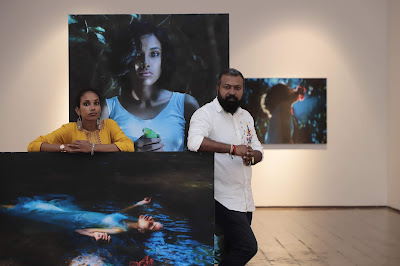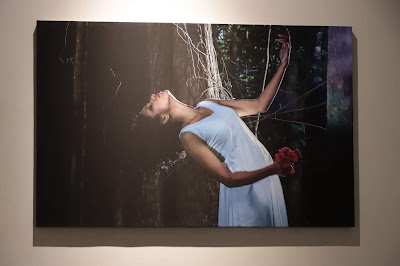In
Hari Krishnan G’s photo exhibition, ‘Secret Garden’, he focuses
on the desire of women to fulfill their dreams and hopes
Pics: Jayanai A and Hari Krishnan G; a still
By
Shevlin Sebastian
A
few years ago, magazine photographer Hari Krishnan G went to the Pain
and Palliative Care Centre in Thrissur to take photos of the founder
Sheeba Ameer. Soon, he got talking to her and realised that Sheeba
herself had gone through a tragedy. Her daughter Niloufa, who was 28,
died on August 27, 2013, after a 16-year-battle with acute myeloid
leukaemia. And Sheeba remembered that near the end, Niloufa said,
'Amma, will I survive or die? Please save me. I want to live'.
“When
Sheeba was telling me all this, I was thinking, ‘How emotionally
strong and courageous women are’,” says Hari.
Later,
he interacted with many women during photo shoots. Another woman he
found unforgettable is designer Uma Haimavati Prajapati who lives in
Pondicherry. “Uma, who is from Delhi, told me that for many years
she had lived for her husband and children,” says Hari. “But when
her children grew up, got married and moved away, she felt it was
time to live for herself. I thought a lot about what she said. We men
fulfill our dreams easily: having a career, buying a plot of land,
building a house, and purchasing a car. But a woman does not have the
same freedom, especially when she gets married. A lot of her dreams
and desires are set aside because of the needs of her husband,
children and in-laws. I feel every woman should have freedom. And the
family should encourage her to grow and develop as a person.”
So,
it was no surprise that for his first solo exhibition, ‘Emotional
Hardcore’ in October 2015, the focus was on woman, but with a
difference: they were all dark-skinned. “I wanted to show how
beautiful they are, while at the same time challenge the notion that
only fair people can be stunning,” says Hari.
In
his second exhibition, in May 2016, he focused on transgenders, while
the third, in March 2018, called ‘Alien’, portrayed women in
solitude. Now, his fourth, called ‘Secret Garden’, at the Durbar
Hall, Kochi, is again focused on women and their desire for freedom.
It
shows a young woman wearing a long white gown, almost like a wedding
dress, in different moods. In one she holds a crown which is perched
on her head, in another she bends her back and looks upwards, with
eyes closed but with roses in her hand, urging the mood of freedom to
flow into her.
In another, she wears a wedding veil with red roses
and green leaves pinned on it, but she is waist-deep in a stream.
There is an image where she looks directly into the camera holding a
green lovebird in her hand. And there is one of her floating face up
in a stream, eyes closed, with a look of tranquillity on her face.
The images, 11 of them, at 6’ x 4’ were shot, with a Canon 6D,
inside a forest in Kollam district. Hari has added a soundtrack of
birds twittering and it adds to the feeling that we are watching
scenes from a forest.
The
model is Jayani A, who is doing her PhD in Special Education in the
School of Behavioural Sciences at MG University, Kottayam. Hari had
seen her photos on Instagram and liked her style and poise. Through a
mutual friend, he approached her. And she was agreeable because she
had seen Hari’s photos earlier. “Images from his earlier
exhibitions had gone viral,” she says.
The
shoot lasted for a few hours. But months later, Jayani is still
excited. “I never felt more liberated as I was during the shoot,”
she says. “Especially when I was lying face-up in the water. At one
moment I felt I was floating in space.”
Later,
Hari got a shock when a friend pointed out that it was similar to
British artist Sir John Everett Millais’ iconic work ‘Ophelia’
(the character from William Shakespeare’s play Hamlet). “I had
not been aware of the artist’s image,” says Hari. “I was struck
by how similar both are.”
What
is amazing about the photos is that they look like a mix of an actual
photo as well as a painting, with diffuseness and splotches at
certain places. But Hari says that these are photos and not a hybrid.
“I did not use photoshop to improve or change the images,” says
Hari, who graduated in Applied Art from Raja Ravi Varma College of
Applied Arts, Mavelikara. But what he did differently was to use
light in a new way. Apart from natural light, he used mirrors as well
as filters.
The
exhibition will be an inspirational one for women visitors, as they
make slow but confident steps to develop their personalities and
talents.
(The
New Indian Express, Kochi, Thiruvananthapuram and Kozhikode)


No comments:
Post a Comment